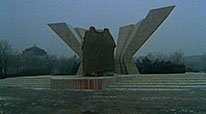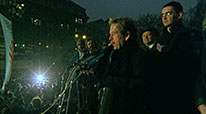 KVETO HECKO
KVETO HECKO
What is it to become a president after years of persecution, denigrations, and imprisonment?
A documentary film-essay about the essence of a person, freshly elected president of Czechoslovakia Vaclav Havel, facing the leadership of a country that had been accusing him for tens of years from the worst intentions by its previous communist leaders, workers, prominent actors, and artists. This quick portrait happens to be drawn on the canvas of his first presidential visit of Bratislava on January 12, 1990. The whole Czechoslovakia is on its firm transition from a totalitarian communist state towards a democracy, albeit still having been occupied by the Soviet army, dwelling here since 1968. But freedom hovers in the air and you can see it on peoples’ faces, Vaclav Havel including.
Our small film crew gets an unprecedented access to document this visit from the Public Against Violence Movement, the strongest and widest democratic political body in Slovak Republic at that time. We can follow president’s activities from the closest proximity, enraging his personal guards with our journalistic intrusions. We are first on the tarmac, when he lands, we are the only film crew examining with him the infamous communist monument Statue spilled by bloody red paint, and we stand six feet from him on the same platform, he addresses thousands of people in the cheering crowd on the central square in Bratislava. As a counterpoint to the happiness, joy and positive emotions you could see in the authentic visuals and synchronous audio, I use the archive commentaries that aired on TV and radio during the years Vaclav Havel had been serving the time in prison or prosecuted. Many people, including prominent actors were accusing him of a treason and described him as person that is threatening the socialist and communist values. As a leading person behind the famous Chart 77 (1977), and 2000 Words (1989) movements he was prosecuted by the state secret police and publicly accused in media.
Also the history of releasing and broadcasting this movie is interesting enough. When I finished the documentary, the local politicians in the National TV banned it. Only after several interventions the movie was finally aired when Vaclav Havel was re-elected as a President in the summer of 1990.
If you are interested in a documentary that shows the direct impact of the broad political changes after the Velvet Revolution in 1989 on the Slovak high school educational system and students, watch the movie The Great School of Days.
- Director, Writer
- Kveto Hecko
- Broadcast
- Czechoslovak Television



